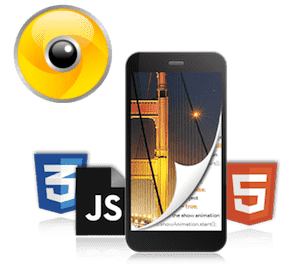
In this article we will make an application for Android with the same features as the application in the last article but this time using the HTML attribute instead of the URI attribute.
One last detail that I forgot to explain in the previous installment: Developing Augmented Reality applications with Wikitude (part 3), is the use of the HTML attribute within the HtmlDrawable class, in this article we will make an application for Android with the same characteristics of the application created in the last article: Developing Augmented Reality Applications with Wikitude (part 3), but this time, we'll use the HTML attribute instead of the URI attribute.
Differences between this installment and the previous one
What would be the difference between creating an infobox with the HTML attribute instead of the URI attribute? the difference is that all the content (HTML) will be inside the "ra.js" instead of being in a separate file, and I say separate file instead of a web-hosted file because URIs can reference so many elements within the apk:
uri:"<NuestroProyecto>/assets/base/WIkitudeParte3DescripcionLibroComoProgramarEnJavaDeitel.html"Or:
uri:"http://www.desarrollolibre.net/public/page/wikitude/WIkitudeParte3DescripcionLibroComoProgramarEnJavaDeitel.html"Our "ra.js" file will look like this:
<html>
var World = {
loaded: false,
init: function initFn() {
this.createOverlays();
},
createOverlays: function createOverlaysFn() {
// creamos un objeto de la clase HtmlDrawable
htmlDrawable = new AR.HtmlDrawable({
html:"<div style='font-size:42px;color:#FFF;background: #068;border: 10px solid #059;border-radius: 5px;padding: 5px;height: auto;'><pre>Este libro presenta las tecnologías </pre><pre>de vanguardia para estudiantes, </pre><pre>profesores y desarrolladores de </pre><pre>software.</pre></div>"
}, 1,{offsetX : -1,rotation:90,opacity : 0.8,scale : 2});
// inicializamos el Tracker con el Target collection (nuestra caratula del libro Deitel)
this.tracker = new AR.Tracker("assets/targetcollection.wtc", {
onLoaded: this.worldLoaded
});
// indicamos el nombre del Target en el Tracker, basicamente al momento de que el Target sea rastreado por el Tracker el objeto htmlDrawable sera renderizado en la pantalla del dispositivo
var javaLibro = new AR.Trackable2DObject(this.tracker, "javaLibro", {
drawables: {
cam: htmlDrawable
}
});
}
};
// principal
World.init();As we can see, both the HTML and the CSS are contained within the div:
html:"<div style='font-size:42px;color:#FFF;background: #068;border: 10px solid #059;border-radius: 5px;padding: 5px;height: auto;'><pre>Este libro presenta las tecnologías </pre><pre>de vanguardia para estudiantes, </pre><pre>profesores y desarrolladores de </pre><pre>software.</pre></div>"Esto resulta en algo bastante molesto y poco práctico, podríamos pensar que es posible colocar el CSS en un archivo aparte, como por ejemplo dentro de un .css:
/WikitudeParteTresDos/assets/base/css/style.css
Or in the index.html:
/WikitudeParteTresDos/assets/base/index.html
But if you do this, Wikitude doesn't look up the styles on these sites and therefore the elements won't get the style.
Conclusions
So, which of the two attributes do we use the HTML or the URI?; it depends on what we want to do, if we are going to have a static content that we are not going to update and it is quite small maybe you consider using HTML, it could be quite useful if we don't want to have so many .html; but if there is a lot of content and styles that we want to update frequently, the URI might be a better option for us.
You can find the complete application in our github repository Android/WikitudeParteTresTwo or by clicking here.
